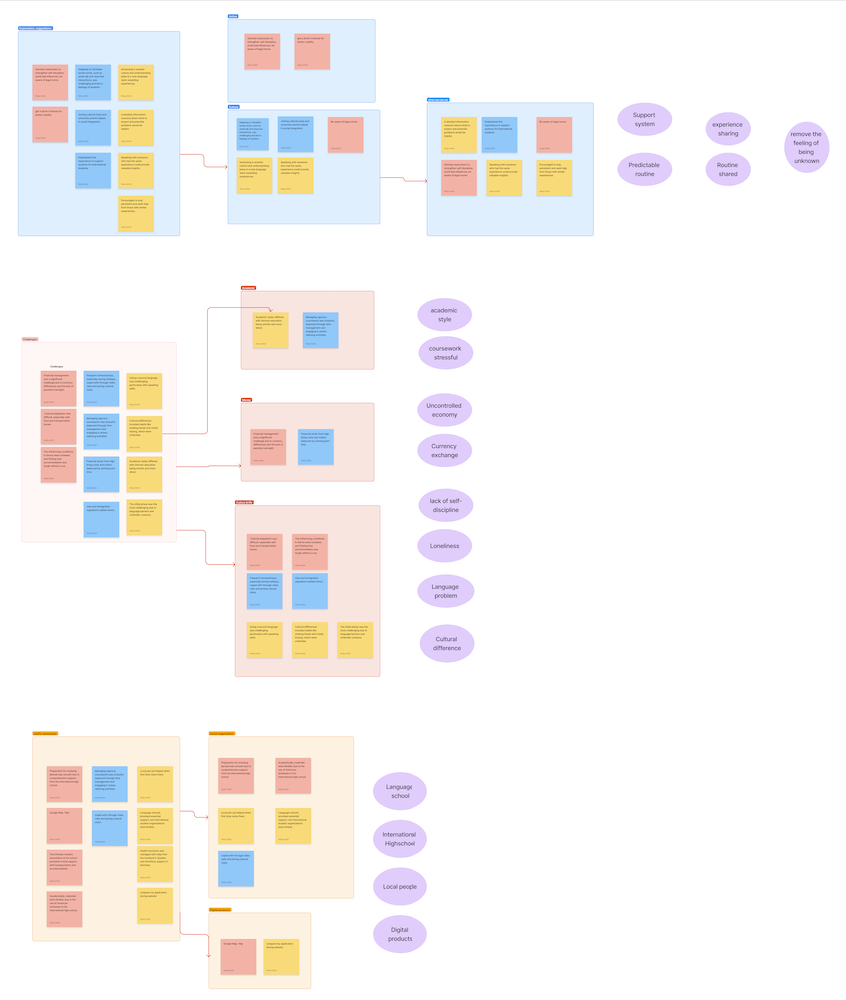🌐Affinity
Shared interests reduce social anxiety.
To make sense of the qualitative data collected from user interviews, I used affinity mapping to cluster related observations and uncover emerging themes. This process helped visualize not just individual pain points, but patterns of emotion, behavior, and need across different participants.
Following the affinity mapping, I conducted a synthesis debrief to reflect on what these themes revealed about the user journey. By reframing the findings into insights, I was able to define Point of View (POV) statements and generate meaningful “How Might We” questions that guided the design direction.
Synthesis Debrief
Introduction:
This synthesis debrief compiles insights from three interviews with international students, BO, Maria, and Maleina, who shared their experiences studying abroad in the US, Canada, and Germany/Quebec, respectively. The debrief highlights common themes, challenges, and strategies these students used to navigate their new environments.
1. Motivations for Studying Abroad:
BO:
- Motivated by parents to avoid intense competition in China and to see the world.
- Studied in the US for undergraduate studies starting in 2018.
Maria:
- Chose to study at the University of Toronto, finding it challenging but rewarding.
Maleina:
- Studied abroad twice for language learning (German and French) and for international
relations.
2. Preparation and Support:
BO:
- Received comprehensive support from his international high school for applications.
- Faced language learning challenges.
Maria
- Managed part-time work and visa status alongside her studies.
- Faced financial strain due to high living costs and tuition fees.
Maleina:
- Conducted online research for Germany; relied on boyfriend’s recommendation for Quebec.
- Encountered different visa processes in Germany and Canada.
3. Cultural and Academic Differences:
BO:
- Experienced cultural shocks such as traffic systems and different educational systems.
- Noted the flexibility in US education compared to mandatory attendance in China.
Maria:
- Struggled with social norms and making friends in Canada.
- Found academic jargon and idiomatic expressions challenging.
Maleina
:- Adjusted to different social customs like shaking hands and cheek kissing.
- Found German teaching style stricter and more direct.
4. Challenges Faced:
BO:
- Managed financial challenges due to currency differences and overspending.
- Faced difficulties in cultural adaptation, particularly with food and transportation.
- Had trouble finding accommodation and adjusting to crowded dorms.
Maria:
- Dealt with language barriers that affected academic performance and confidence.
- Experienced homesickness and social isolation.
- Felt the pressure of rigorous coursework and maintaining visa status.
Maleina:
- Initially intimidated by language barriers in both Germany and Quebec.
- Encountered initial loneliness and difficulties in communicating frustrations.
5. Useful Resources:
BO:
- Utilized Google Maps and Yelp for daily navigation and finding services.
Maria:
- Joined cultural clubs and participated in university events to feel more connected.
Maleina:
- Language schools provided significant support, but there were limited international student
organizations.
6. Health and Well-being:
BO:
- Did not specifically mention health-related issues.
Maria:
- Struggled with adjusting to the cold climate in Canada.
- Used university health services and maintained good health habits.
Maleina:
- Managed health insurance with her husband’s help in Quebec.
- Benefited from dormitory support in Germany.
7. Integration and Social Support:
BO:
- Relied on the Chinese student association for initial support and smooth transition.
Maria:
- Found joining cultural clubs and university events beneficial for integration.
Maleina:
- Improved language skills over time, which helped with social integration.
8. Advice and Suggestions:
BO:
- Emphasized the importance of self-discipline, avoiding bad influences, and understanding
legal norms.
- Recommended getting a driver’s license to improve mobility and quality of life.
Maria:
- Highlighted the importance of support systems for international students.
- Suggested that universities improve their services for international students.
Maleina:
- Suggested having a detailed information resource about what to expect, potential problems,
and cultural differences.
- Recommended speaking with someone who had a similar experience for valuable insights.
9. Loneliness and Family Contact:
BO:
- Did not specifically mention issues with family contact.
Maria:
- Frequently felt homesick and coped through video calls and social media.
Maleina:
- Experienced challenges with time zone differences and initial lack of phone access in dorms.
Conclusion:
The interviews reveal common themes among international students, including the challenges
of cultural adaptation, language barriers, financial management, and the importance of support
systems. Each student's experience highlights the need for better resources and support
structures to help international students navigate their new environments more effectively. The
insights gathered can guide universities and support organizations in enhancing their services to
foster a more inclusive and supportive experience for international students.


